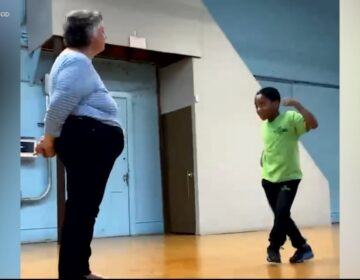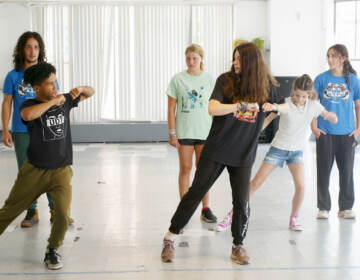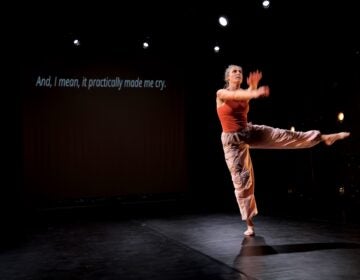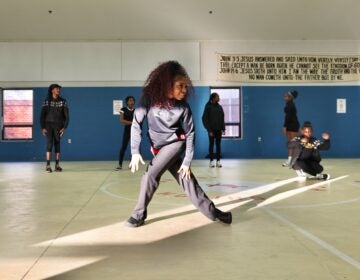A Philadelphian helped pave the way to breaking’s Olympic debut in Paris
Breakdancing has been around since the 1980s. It’s finally getting its due at the 2024 Olympic Games.
Listen 6:09
Logan Edra, of the United States breakdancing team, dances as she travels along with teammates on the Seine River in Paris, France, during the opening ceremony of the 2024 Summer Olympics, Friday, July 26, 2024. (AP Photo/Ashley Landis, Pool)
From Philly and the Pa. suburbs to South Jersey and Delaware, what would you like WHYY News to cover? Let us know!
New to the Olympics in 2024? Breaking, also known as breakdancing.
The dance form is a pillar of hip-hop culture and got its start in the 1980s in Brooklyn.
And here’s a fun fact: A Philadelphian helped pave the long road that led to breaking appearing in the Paris games.
Zack Slusser has spent years breakdancing. He’s the vice president of DanceSport Breaking at USA Dance and Breaking for Gold USA.
WHYY “Morning Edition” host Jennifer Lynn spoke with him before he left for France with Team USA.
Jennifer Lynn: It was a long road to bring breaking to the Paris Olympics, and my understanding is that breakdancing needed a platform from which to be considered a sport — and ballroom dancing was an important avenue to gain that kind of traction. Why ballroom dancing?
Zackary Slussler: So, probably the most comical portion of all this is that somehow ballroom dancing ended up as the governing body over probably the most controversial, edgy, street dance you could possibly think of. You couldn’t put two polar opposites further away from one another and they end up in the same house. The way it worked out is that within the Olympic scope, the IOC has a very formal process for governance over all the sports that are managed under the IOC’s platform. The IOC is the International Olympic Committee. Breaking as a global entity or as a global community has no global infrastructure. There is no organization that standardizes how we’re going to do breaking here in this country versus here, or how we’re going to do it altogether. It doesn’t exist. So that was one of the big hurdles as the International Olympic Committee has kind of pivoted in terms of their direction for new sports to try and onboard Gen Z — and the only international federation that was accredited that had an assemblance of relating to dance was the ballroom organization.
JL: How did you slip into the role that you have and get to broker breakdancing in Paris?
ZS: When I was breaking competitively I met a very prominent individual, somebody that I would say is a philanthropist, and they entered the community and together helped found an educational nonprofit that also we built in a for-profit subsidiary within that nonprofit — and started a tour here in America back in the early 2010s. By 2014 we were contacted about the prospect of breaking being at the Youth Olympic Games in 2018. It was this huge success. We on the backend facilitated whatever needed to happen. We did a bunch of work trying to position breaking to get into the Paris games, which miraculously ended up happening where it was included, and we onboarded and created a program comprised of the breaking community here in America to help qualify, manage and run Team USA.
JL: And the time has come for breakdancing in Paris, but it will not be in the 2028 LA Olympics, ironically.
ZS: Correct, yes. Unfortunately, before we were even in Paris 2024, breaking was voted out and not included in the LA 2028 Olympics. It’s very unfortunate, but it does not mean that breaking falls out of the Olympic family. It will still be included in the Youth Olympic Games in 2026 in Dakar, and we also have the opportunity of maybe being able to get it back into Brisbane 2032, which will be decided by 2027.
JL: Does the Olympic sport of breakdancing mainstream breakdancing in a way that it loses the luster, the depth of its racial and cultural roots?
ZS: I think that’s a legitimate argument actually. I do believe that there’s a difference between commercial mainstream competition breaking and then, if you were to go to your local city event that happens, it’s much more communal. It’s much more cultural. There might be a competition there, but the competition is not by any means the highlight of the event.
JL: Breaking has really gone global.
ZS: Breaking is a global community. Our primary competition in the Olympics here is the Japanese. [For the] Paris 2024 Olympics, the French Olympic Committee has onboarded breaking simply because urban street dance is so popular in France that it’s part of their culture. Their government subsidizes programs and events for it over there. Dancers make their living off of government programs and artistry programs.
JL: I guess we don’t have that in the U.S. You said the U.S. will not be hosting breaking in the Olympics in 2028 in LA. That still doesn’t make any sense to me.
ZS: You see in certain pockets of the world, just this huge interest and this infrastructure built in much like you would see in the United States with youth soccer or something. These kinds of platforms exist elsewhere, but within the United States breaking remains “in the YMCA basement,” simply because it hasn’t been proven as a successful commercial vehicle worth investment. But we are seeing that being built up now with the Olympic opportunity itself. More brands are coming in here, and we’re hoping for a big success post-Paris versus what it has been previously.

Get daily updates from WHYY News!
WHYY is your source for fact-based, in-depth journalism and information. As a nonprofit organization, we rely on financial support from readers like you. Please give today.







